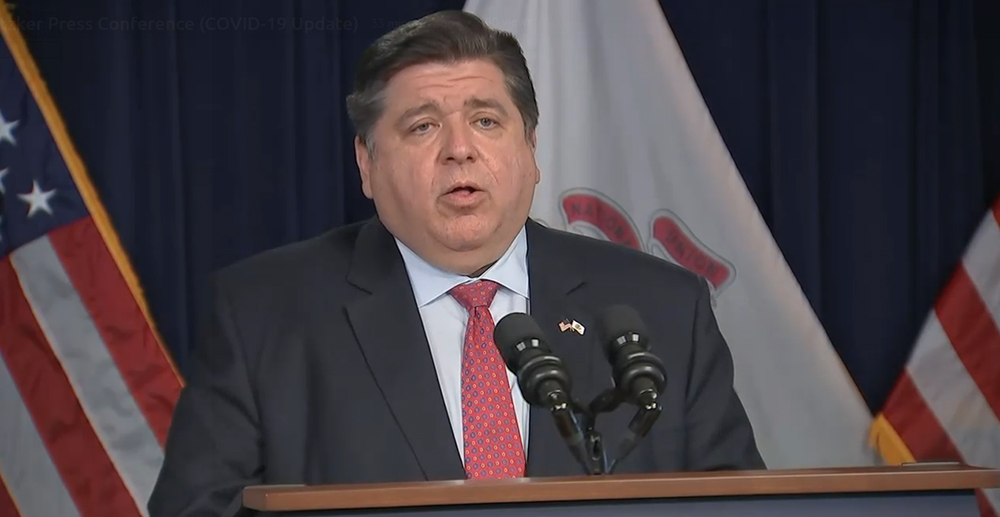COVID spike forces General Assembly to call off in-person sessions next week

SPRINGFIELD – A continuing sharp spike in COVID-19 cases being driven by the omicron variant has pushed the state’s hospital capacity to its limits and is prompting the state to bring in additional health care workers from other states and countries.
Gov. JB Pritzker said Wednesday that more than 2,000 additional health care workers have been deployed throughout the state, including 919 in hospitals hit hard by the surge, with another 552 scheduled to arrive within the next several days.
“This current wave of COVID is causing more people to get sick than ever before in the pandemic,” Pritzker said. “And the vast majority of the serious illnesses and deaths are among the unvaccinated.”
As of Wednesday, the Illinois Department of Public Health was reporting 7,219 people hospitalized with COVID-19 in the state, down slightly from the record 7,353 who were hospitalized on Tuesday. Another 271 people in the state had died of the disease just since Monday.
“We have never had this many COVID patients in the hospital at any point in the pandemic. Not in spring of 2020; not in the winter of 2020,” IDPH Director Dr. Ngozi Ezike said, noting that the previous pandemic record was 6,175, set in November 2020.
Over the past seven days, more than 227,000 new cases have been confirmed in Illinois out of 1.9 million tests performed, for a seven-day case positivity rate of 12 percent.
“But as difficult as this moment is, there will be an end to it,” Pritzker said. “We have all the necessary tools for prevention, and we are nearer than ever to having everything we need to detect and treat the disease to keep even the most vulnerable people alive. I can’t say enough about how extraordinary our hospitals and our health care heroes have been throughout this pandemic.”
Pritzker said the state was taking several actions to bolster its health care workforce, such as allowing out-of-state health care providers to continue practicing in Illinois with expanded permissions to care for all patients, not just COVID-19 patients.
In addition, doctors trained in other countries have been given permission to provide assistance to licensed physicians in Illinois. And out-of-state providers, including physicians, nurses and mental health providers, are being allowed to provide telehealth services to patients in Illinois if they have a pre-existing provider-patient relationship.
Meanwhile, Pritzker issued an executive order late Tuesday spelling out protocols that schools now need to follow whenever a student or school employee tests positive for COVID-19.
Consistant with the latest guidance from the Centers for Disease Control and Prevention, the order requires infected individuals, regardless of their vaccination status, to be excluded from school premises for a minimum of five days and a maximum of 10 days following the onset of symptoms or the date of their test.
Schools also must exclude students or employees who come in close contact with an infected person for a minimum of five days after their exposure, and those individuals must continue to wear a mask at all times around others, including when outdoors, for an additional five days after they return to school.
The surge in COVID-19 cases has also resulted in other state actions.
House and Senate leaders in the General Assembly announced Wednesday that they were canceling in-person session days next week, although committees will continue to meet remotely.
“Given the recent COVID-19 numbers, this is not the time to bring hundreds of people together inside the Capitol,” Senate President Don Harmon, D-Oak Park, said in a statement. “Through our remote committee process we have proven that we can get work done, protect people’s health and at the same time expand the legislative process to people who might want to testify but wouldn’t have the time or resources to come to Springfield.”
And the Illinois Department of Corrections announced that it was pausing all inmate transfers into state facilities from county jails as it responds to COVID-19 outbreaks in IDOC facilities.
“Congregate living facilities present unique infection control challenges due to the lack of quarantine and isolation space,” IDOC Director Rob Jeffreys said in a statement Wednesday. “The Department recognizes the hardships county jails face when we cannot accept admissions, but we must take aggressive action to keep the community and everyone who lives and works in our facilities safe and healthy.”
Miss Clipping Out Stories to Save for Later?
Click the Purchase Story button below to order a print of this story. We will print it for you on matte photo paper to keep forever.

